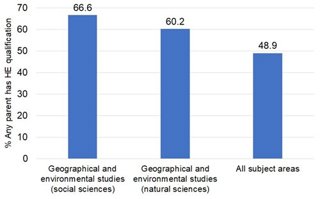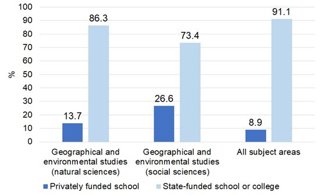This page contains a collection of equality, diversity and inclusion (EDI) resources with relevance to social class. These resources were collated as part of the project Enabling equitable cultures of knowledge and practice in physical geography and environmental sciences, funded by the Natural Environment Research Council (NERC).
This page is dynamic; if you know of other relevant resources or wish to submit your own case study, we’d like to hear from you at rhed@rgs.org
The Society does not accept responsibility for the content of the external sites. Inclusion on this list does not equate to an endorsement of any content or organisation. Please contact the external site for questions regarding individual resources.
Contextual data
In 2019/20 the proportion of first degree undergraduate geography students from privately finded schools was 13.7% and 26.6% (natural science and social sciences respectively), compared with 8.9% across all subjects.PI)

Geography students by secondary school type (Data source: AdvanceHE)
60.2% and 66.6% of geography students (natural science and social sciences respectively) had at least one parent with an HE qualification, compared with 48.9% across all subjects.

Geography students by parental education (Data source: AdvanceHE)
The Society, along with the wider geographical community, has known for a long time that geography attracts a disproportionately low number of young people from disadvantaged and Black and ethnic minority backgrounds to study the subject. The Society therefore commissioned a significant piece of independent research using the Department for Education’s National Pupil Database and linked HESA data (information on students at university) to answer our questions. Given the source of the schools data, the results are for England only for the period from 2009/10 to 2017/18. We hope similar analyses will be undertaken in Scotland, Wales and Northern Ireland. The approach we took and key results are presented in the summary report and supplementary data which can all be downloaded below.
Reports, guidance and toolkits
APPG Diversity and Inclusion in STEM, Inquiry in Equity in STEM Education: Final Report
British Science Association (UK)
The All-Party Parliamentary Group on Diversity & Inclusion (D&I) in STEM aims to promote the inclusion and progression of people from diverse backgrounds in STEM, and to encourage government, parliamentarians, academics, businesses and other stakeholders to work towards a STEM sector that is representative of the population.
Advancing equity, diversity and inclusivity in the environmental sciences. Collaborative Inclusivity Roundtable Series: Summary report
NERC (UK)
The aim of the Collaborative Inclusivity roundtable series was to create a shared space to value lived experience. It aims to share best practice, and identify actions to overcome barriers.
Selected readings
- Urban, M.A. (2018) In Defense of Crappy Landscapes (Core Tenet #1). In: Lave, R., Biermann, C., Lane, S. (eds) The Palgrave Handbook of Critical Physical Geography. Palgrave Macmillan, Cham. Access the article.
Other resources
Geography of geography: the evidence base
New to teaching geography
A practical guide for higher education teaching assistants, teaching fellows and demonstrators.
What works for teaching and learning in HE GEES?
A teaching-focused blog for academics in Geography, Earth and Environmental Sciences
Relevant organisations
Featured image: Jay Mullings/Adobe Stock




